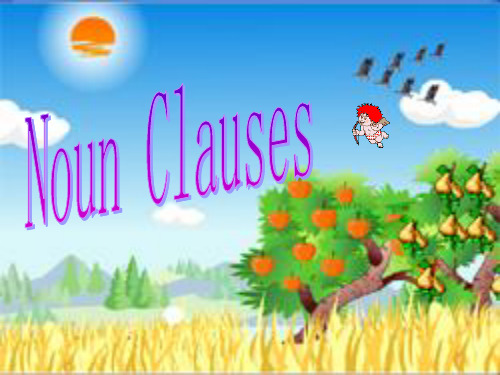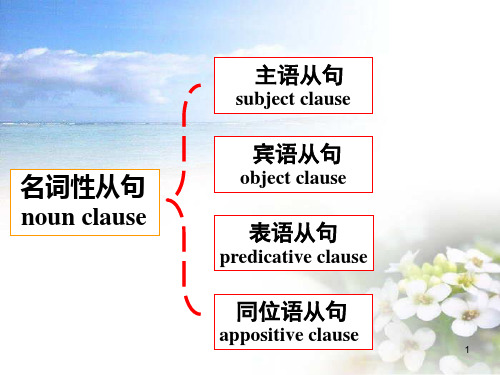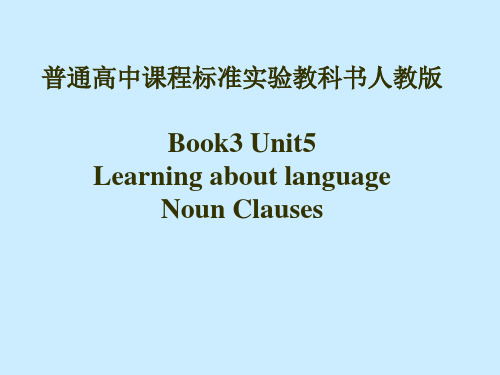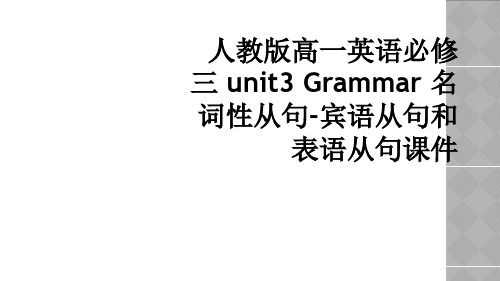人教新课标必修三英语语法-名词性从句[教学课件]
合集下载
必修三《名词性从句》课件(共26张PPT)

7. My suggestion is ______ we should
turn the land into rice fields.
A. what
C. which
B. that
D. where
8. His proposal is that the dam ______
at the foot of the mountain.
{
同位语 I don’t know about the fact that he is a teacher
{
I don’t know about the man, Mr. White.
Fan Bingbing and Lichen are dating.
The big news makes their fans surprised That Fan Bingbing and Lichen are
Practice time
二、名词性从句的写法 名词性从句是学生在写作中喜欢尝试的 复杂句,在写作时可采用“三步法”:
[示例]
第一步:写出两个简单句。
①He said a lot at the meeting.
②His words were very attractive.
第二步:让句①作主语从句,可转换为“他在会上所说的话”,即what he said at the meeting。 第三步:把句①转换的主语从句和句②连在一起。 What he said at the meeting was very attractive.
[即时演练] 把下列每组题中的两个简单句合并为一个含有名词性从句的复合句 1.When did you enter the room? The police wants to know it. ____________________________________________________________________
人教必修三 unit3名词性从句(共23张PPT)

句式 连词 语序 例句
陈述句 that
不变
一般疑问 if/whether 改为陈
句
述语序
I think (that)we can be good friends.
I can’t remember if/whether I posted the letter.
特殊疑问 特殊疑问 改为陈 He gave up what she was
句
词
述语序 doing.
Note:
(1)当that 从句与另一名词性从句并列作 宾语时,第二个that不能省; (2)当that作介词宾语时,that不可省掉; (3)用it做形式宾语的宾语从句。
Everyone knew what happened and that she was worried. The reason lies in that she works harder than the others do. I think it necessary that you should read English aloud.
faster than sound.
travels
4.Could you tell me when w___i_l_l_h__e_ arrive?
he will 5.You can begin to see why d__o_e__s__E__n_g__l_i_s_h__h__a_v__e_
such strange rules.
改错:
1. He asked me whether I_h__a_v__e ever been to
the seaside.
had
2.She said that she_w___il_l_ go to the park with
人教版高中英语必修三Unit 4 名词性从句 (共55张PPT)

not. 4. I don’t knoww_h_e_t_h_e_r__ or not he is well. 5. I don’t knoww_h_e_th_e_r__ to go.
3) 当宾语从句是特殊疑问句时, 由连接代词 (what, who, whom, which, whose) 或连接副词 (when, where, how, why)引导,以上连词有词义, 做成分,不可省略。
宾语从句的三大要素
引导词 语序 时态
引导词
连词:that, if/whether, as if/though
连接代词:(做主语、宾语、表语、定语): what(whatever)任何事/who(whoever)任 何人/whom/whose/which( whichever) 任何一个 连接副词: where (wherever ) 任何地方 (做状语) when(whenever) 每当
(4)I didn’t know when he _________ (come) tomorrow. (5) I didn’t know what he _____ (do) yesterday. (6) I didn’t know how she ____ (get) to school .
主句
名词性从句
名词在句子中可以充当主语、宾语、表 语、同位语,但如果名词充当的成分 (主语、宾语、表语、同位语)是一个 个句子,那么我们就把它称为名词性从 句。
因此根据名词在句中所担当的成分,名 词性从句又可分为主语从句、宾语从句、 表语从句和同位语从句。(如下图所示)
名词性从句 noun clause
3.We Chinese are peace-loving.
apposition predicative
3) 当宾语从句是特殊疑问句时, 由连接代词 (what, who, whom, which, whose) 或连接副词 (when, where, how, why)引导,以上连词有词义, 做成分,不可省略。
宾语从句的三大要素
引导词 语序 时态
引导词
连词:that, if/whether, as if/though
连接代词:(做主语、宾语、表语、定语): what(whatever)任何事/who(whoever)任 何人/whom/whose/which( whichever) 任何一个 连接副词: where (wherever ) 任何地方 (做状语) when(whenever) 每当
(4)I didn’t know when he _________ (come) tomorrow. (5) I didn’t know what he _____ (do) yesterday. (6) I didn’t know how she ____ (get) to school .
主句
名词性从句
名词在句子中可以充当主语、宾语、表 语、同位语,但如果名词充当的成分 (主语、宾语、表语、同位语)是一个 个句子,那么我们就把它称为名词性从 句。
因此根据名词在句中所担当的成分,名 词性从句又可分为主语从句、宾语从句、 表语从句和同位语从句。(如下图所示)
名词性从句 noun clause
3.We Chinese are peace-loving.
apposition predicative
人教版高中英语必修三教学课件:Book3第3单元语法

3. Theotherday,mybrotherdrovehiscardo wnthestreetat_____Ithowuhgahttwasadange rousspeed.(04)
4.Alongwiththeletterwashispromise____h etwhaotuldvisitmethiscomingChristmas.(04) 5.Theshopkeeperdidnotwanttosellfor____ hethoughtwasnotenough.(05) w6.hIhaat vealwaysbeenhonestandstraightforw ard,anditdoesn’tmatter________I’mtalki ngto.(04) whoever
7.Parentsaretaughttounderstand____hiomwp ortanteducationistotheirchildren’sfuture. (04) 8.ThesewildflowersaresospecialIwoulddo ________Iwcahnattoesvaevrethem.(00) 9.Ireadaboutitinsomebookorother,doesis matter_______itwas?(01)
8.那是因为他没有理解我。 That’sbecausehedidn’tunderstandme. 9.我的建议是我们明天一早就出发。 Mysuggestionisthatwe(should)startearlyto morrowmorning. 10.谁知道将来会发生什么? Whoknowswhatwillhappeninthe future?
(2)由what,whether(if)引导的宾语从 句,例如:
4.Alongwiththeletterwashispromise____h etwhaotuldvisitmethiscomingChristmas.(04) 5.Theshopkeeperdidnotwanttosellfor____ hethoughtwasnotenough.(05) w6.hIhaat vealwaysbeenhonestandstraightforw ard,anditdoesn’tmatter________I’mtalki ngto.(04) whoever
7.Parentsaretaughttounderstand____hiomwp ortanteducationistotheirchildren’sfuture. (04) 8.ThesewildflowersaresospecialIwoulddo ________Iwcahnattoesvaevrethem.(00) 9.Ireadaboutitinsomebookorother,doesis matter_______itwas?(01)
8.那是因为他没有理解我。 That’sbecausehedidn’tunderstandme. 9.我的建议是我们明天一早就出发。 Mysuggestionisthatwe(should)startearlyto morrowmorning. 10.谁知道将来会发生什么? Whoknowswhatwillhappeninthe future?
(2)由what,whether(if)引导的宾语从 句,例如:
人教新课标必修三英语语法-名词性从句(课堂用)

常用并列连词:
并列句
and, both…and, not only… but also, • 平行并列连词: neither…nor • 转折并列连词:but, however, while, yet, • 因果并列连词: for, therefore,so
• 选择并列连词: or,either…or
同位语
I don’t know about the man, Mr. White. I don’t know about the fact that he is a teacher.
名词性从句的作用相当于名词,因此主语从 句、表语从句 、宾语从句和同位语从句分别作 主句的主语、表语、宾语和同位语。
英语句子概论 英语句子的种类
简单句 (simple sentence) 并列句 (compound sentence)
复合句 (come weather is very cold. 主语+谓语(连系动词)+表语 He laughed. 主语+谓语(vi.) I like Chinese food. 主语+谓语(vt.)+宾语 She taught them physics. 主语+谓语(vt.)+间接宾语+直接宾语 We must keep the room warm. 主语+谓语(vt.) +宾语+宾语补足语
if /whether (3).She asked me--------- she could borrow these books .
注意 whether和if的使用区别:
• 注意: 用whether或if引导的宾语 从句,其主语和谓语的顺序也不能 颠倒,仍保持陈述句语序。此外, whether与if 在作“是否”的意思 讲时在下列情况下一般只能用 whether,不用if: • a. 引导主语从句并在句首时;b. 引导表语从句时;c . 引导从句作 介词宾语时;d. 从句后有“or not” 时;e. 后接动词不定式时。
并列句
and, both…and, not only… but also, • 平行并列连词: neither…nor • 转折并列连词:but, however, while, yet, • 因果并列连词: for, therefore,so
• 选择并列连词: or,either…or
同位语
I don’t know about the man, Mr. White. I don’t know about the fact that he is a teacher.
名词性从句的作用相当于名词,因此主语从 句、表语从句 、宾语从句和同位语从句分别作 主句的主语、表语、宾语和同位语。
英语句子概论 英语句子的种类
简单句 (simple sentence) 并列句 (compound sentence)
复合句 (come weather is very cold. 主语+谓语(连系动词)+表语 He laughed. 主语+谓语(vi.) I like Chinese food. 主语+谓语(vt.)+宾语 She taught them physics. 主语+谓语(vt.)+间接宾语+直接宾语 We must keep the room warm. 主语+谓语(vt.) +宾语+宾语补足语
if /whether (3).She asked me--------- she could borrow these books .
注意 whether和if的使用区别:
• 注意: 用whether或if引导的宾语 从句,其主语和谓语的顺序也不能 颠倒,仍保持陈述句语序。此外, whether与if 在作“是否”的意思 讲时在下列情况下一般只能用 whether,不用if: • a. 引导主语从句并在句首时;b. 引导表语从句时;c . 引导从句作 介词宾语时;d. 从句后有“or not” 时;e. 后接动词不定式时。
人教高中英语必修3Unit5名词性从句(共40张PPT)

(2)同位语从句在句子中的 位置
同位语从句有时可以不紧
跟在它所说明的名词后面, 而是被别的词隔开。例如:
He got the news from Mary that the sports meeting was put off.
(3)同位语从句与定语从句 的区别 ①定语从句中的 that 既可 代替先行词,同时可以在 从句中做某个成分(主语或 宾语),而同位语从句中的 that 是连词,只起连接主 句与从句的作用,不充当 句中任何成分。
He impressed the manager as an
honest man.(√)
He impressed the manager that he was an honest man.(×)
(7)否定的转移 若主句谓语动词为 think, consider,suppose,believe, expect,guess,imagine 等, 且主语为第一人称,其后的宾 语从句若含有否定意义,一般 要把否定词转移到主句谓语上, 从句谓语用肯定式。例如:
②定语从句是形容词性的,其功能 是修饰先行词,对先行词加以限定, 描述名词的性质或特征;同位语从 句是名词性的,其功能是对名词进 行补充说明。例如
:
a.The news that he told me is
that Tom would go abroad next year.他告诉我的消息是汤姆明年 将出国。(定语从句,第一个 that 在句中做 told 的直接宾语。) b.The news that Tom would go abroad is told by him.汤姆将出国 的消息是他讲的。(同位语从句, that 在句中不做任何成分)
八 后置主语从句和强调句的
人教高中英语必修3unit3名词性从句课件(共20张ppt)

1.that只起连接主句和从句的作用,在从句中不担任任 何成分,本身也没有词义; 2. 宾语从句中可省略,引导主语从句、表语从句和同位 语从句,that不可省略。
一.主语从句
主语从句是在复合句中充当主语的从句,通常放 在主句谓语动词之前或由形式主语it代替,而本身放 在句子末尾。
1. It 作形式主语 It 作形式主语代替主语从句,主要是为了平衡句子
D. we should develop
2.It is necessary that ______ by the end of the week.
A. we got everything ready B. we have got everything ready
C. We get everything ready D. we must get everything ready
I heard that he joined the army. (2) 由what, whether (if) 引导的宾语从句,例如:
She did not know what had happened. (3) 动词+间接宾语+宾语从句。例如:
She told me that she would accept my invitation. 2. 作介词的宾语,例如:
同位语从句对于名词进一步解释,说明名词的具体内容, 一般由that引导,例如: The order that all the soldiers should stay still is given by the general. 2. 同位语在句子中的位置
同位语从句有时可以不紧跟在它所说明的名词后面, 而是被别的词隔开。例如:
常见的系动词
一是 二保持 三看 四变 五起来
一.主语从句
主语从句是在复合句中充当主语的从句,通常放 在主句谓语动词之前或由形式主语it代替,而本身放 在句子末尾。
1. It 作形式主语 It 作形式主语代替主语从句,主要是为了平衡句子
D. we should develop
2.It is necessary that ______ by the end of the week.
A. we got everything ready B. we have got everything ready
C. We get everything ready D. we must get everything ready
I heard that he joined the army. (2) 由what, whether (if) 引导的宾语从句,例如:
She did not know what had happened. (3) 动词+间接宾语+宾语从句。例如:
She told me that she would accept my invitation. 2. 作介词的宾语,例如:
同位语从句对于名词进一步解释,说明名词的具体内容, 一般由that引导,例如: The order that all the soldiers should stay still is given by the general. 2. 同位语在句子中的位置
同位语从句有时可以不紧跟在它所说明的名词后面, 而是被别的词隔开。例如:
常见的系动词
一是 二保持 三看 四变 五起来
高中英语语法之名词性从句-PPT优秀课件

was worried. 2.The reason lies in that she works harder
than the others do. 3.I think it necessary that you should read English
aloud.
12
2.由从属连词if / whether 引导的宾从
It’s a pity/a fact /a common knowledge (众所周知)/ a common saying that… (俗话说)
6
A. It +be+adj (important/ essential/
B. natural/ necessary)+ that sb. should do sth.
• It +be+adj (amazing/ clear/certain…) +that从句
• It is certain that we will do a good job.
• It is very clear that we should leave.
B. It +be + n ( a pity/ a fact/ a good idea/ an honor/ a mystery/ a pleasure/ a shame/ a wonder/ a challenge…) + that从句
4. He said he was watching TV/ he had swept the floor/ he would play football after school.
5. 3. 如果宾语从句所叙述的是客观事实、自然现象、科 学真理等时,从句不受主句限制,用一般现在时。
than the others do. 3.I think it necessary that you should read English
aloud.
12
2.由从属连词if / whether 引导的宾从
It’s a pity/a fact /a common knowledge (众所周知)/ a common saying that… (俗话说)
6
A. It +be+adj (important/ essential/
B. natural/ necessary)+ that sb. should do sth.
• It +be+adj (amazing/ clear/certain…) +that从句
• It is certain that we will do a good job.
• It is very clear that we should leave.
B. It +be + n ( a pity/ a fact/ a good idea/ an honor/ a mystery/ a pleasure/ a shame/ a wonder/ a challenge…) + that从句
4. He said he was watching TV/ he had swept the floor/ he would play football after school.
5. 3. 如果宾语从句所叙述的是客观事实、自然现象、科 学真理等时,从句不受主句限制,用一般现在时。
新课标人教版必修三unit 3名词性从句(共44张PPT)

That The t child doesn’t know the answer . It makes the teacher angry.
1. It is important to learn English well. That is known to all of us.(主语从句)
Comparing
It is three to five now, and the football match is about to begin. But there is a problem. Jim hasn’t turned up yet. He is a leading part of our team. Without him, it is difficult for us to win the game. So we worry about it. • It is three to five now , and the football match is to begin. But there is a problem that Jim hasn’t turned up yet . It is known to everybody that he is a leading part of our team. Without him, it is difficult for us to win the game. That’s why we are so worried.
3. 引导名词性从句的连接词
名词性从句中的连接词 从属 连词 在从句中作用 意义 不作从句成分,无意义 只起连接作用 “是否”
that, whether/if
连接 代词
what,which,who, 在从句中作 有各自 whom, whose,whatever, whichever,whoever, 主语、宾语、 含义 表语、 定语 whomever
高中英语人教新课标必修三 Unit3 名词性从句第一课课件(共31张)

It is reported that... It is told that... It is well known that... It is announced that...
2.可以用形式宾语it的宾语从句 a. 在动词find, feel, think, consider, make, believe等后有宾语补足语时; I think it necessary that we drink a lot of water every day.
• 听歌放松下,寻觅一下名词性从句
•周末作业:搜“as long as you love me”, 打印歌词,找到其中的名词性从句 •打印群文件中的“名词性从句讲义”
1) What you said is true. = The thing that you said is true. 2) We’ll do what the Party asks us to do. 3) It isn’t what I want.
4. what clause • 相当于汉语的“的”字结构 • 相当于“先行词+引导词”两部分组成
1)When the meeting will be held is not known.
2) We don’t know who will chair the meeting.
3. The problem where the meeting will be held is important.
4.Our doubt is why the meeting will be held.
名词性从句
它是单词中的劳模,除了谓语和 修饰,啥都想演
看题
•瞧瞧,名词性从句就是这么的 简单,一目了然
2.可以用形式宾语it的宾语从句 a. 在动词find, feel, think, consider, make, believe等后有宾语补足语时; I think it necessary that we drink a lot of water every day.
• 听歌放松下,寻觅一下名词性从句
•周末作业:搜“as long as you love me”, 打印歌词,找到其中的名词性从句 •打印群文件中的“名词性从句讲义”
1) What you said is true. = The thing that you said is true. 2) We’ll do what the Party asks us to do. 3) It isn’t what I want.
4. what clause • 相当于汉语的“的”字结构 • 相当于“先行词+引导词”两部分组成
1)When the meeting will be held is not known.
2) We don’t know who will chair the meeting.
3. The problem where the meeting will be held is important.
4.Our doubt is why the meeting will be held.
名词性从句
它是单词中的劳模,除了谓语和 修饰,啥都想演
看题
•瞧瞧,名词性从句就是这么的 简单,一目了然
人教版高一英语必修三 unit3 Grammar 名词性从句-宾语从句和表语从句课件

My suggestion is that we (should) go and help him. 我的建议是我们去帮助他。
• 1.The trouble is ______ I have lost his addrtehsast . • 2.The reason ____ he was late was ____ he missed the first bus this morning. • 3.His proposal was that we _________ (collect)all the related information.
注意
demand, order, suggest, advise, insist, desire, request, propose, command 等表示“要求、命令、建议、决定”等动词后接宾语从句时,宾 从的谓语用 “(should+)动词原形”,表示虚拟语气。
Observation(two) lI would appreciate if you would like to teaict h me how to use the computer. lI hate when thitey talk with their mouths full of food.
介词+宾语从句
l I lived in what you call “Ancient Greece”.
summary
介词 + whether + 陈述句 介词 + wh-词 + 陈述句
注意注意
l 宾语从句的时态必须与主句呼应: 1)主句—现在或将来时态,宾从—根据需要使用任何时态 2)主句—过去时态, 宾从—过去时态 【例外】: 主句—过去时态,宾从—一般现在时态 (宾从表示的是客观事实、自然现象或真理时)
• 1.The trouble is ______ I have lost his addrtehsast . • 2.The reason ____ he was late was ____ he missed the first bus this morning. • 3.His proposal was that we _________ (collect)all the related information.
注意
demand, order, suggest, advise, insist, desire, request, propose, command 等表示“要求、命令、建议、决定”等动词后接宾语从句时,宾 从的谓语用 “(should+)动词原形”,表示虚拟语气。
Observation(two) lI would appreciate if you would like to teaict h me how to use the computer. lI hate when thitey talk with their mouths full of food.
介词+宾语从句
l I lived in what you call “Ancient Greece”.
summary
介词 + whether + 陈述句 介词 + wh-词 + 陈述句
注意注意
l 宾语从句的时态必须与主句呼应: 1)主句—现在或将来时态,宾从—根据需要使用任何时态 2)主句—过去时态, 宾从—过去时态 【例外】: 主句—过去时态,宾从—一般现在时态 (宾从表示的是客观事实、自然现象或真理时)
英语必修三unit3名词性从句知识分享共44页文档

END
英语必修三unit3名词性从句知识分享
51、没有哪个社会可以制订一部永远 适用的 宪法, 甚至一 条永远 适用的 法律。 ——杰 斐逊 52、法律源于人的自卫本能。——英 格索尔
53、人们通常会发现,法律就是这样 一种的 网,触 犯法律 的人, 小的可 以穿网 而过, 大的可 以破网 而出, 只有中 等的才 会坠入 网中。 ——申 斯通 54、法律就是法律它是一座雄伟的大ห้องสมุดไป่ตู้夏,庇 护着我 们大家 ;它的 每一块 砖石都 垒在另 一块砖 石上。 ——高 尔斯华 绥 55、今天的法律未必明天仍是法律。 ——罗·伯顿
16、业余生活要有意义,不要越轨。——华盛顿 17、一个人即使已登上顶峰,也仍要自强不息。——罗素·贝克 18、最大的挑战和突破在于用人,而用人最大的突破在于信任人。——马云 19、自己活着,就是为了使别人过得更美好。——雷锋 20、要掌握书,莫被书掌握;要为生而读,莫为读而生。——布尔沃
相关主题
- 1、下载文档前请自行甄别文档内容的完整性,平台不提供额外的编辑、内容补充、找答案等附加服务。
- 2、"仅部分预览"的文档,不可在线预览部分如存在完整性等问题,可反馈申请退款(可完整预览的文档不适用该条件!)。
- 3、如文档侵犯您的权益,请联系客服反馈,我们会尽快为您处理(人工客服工作时间:9:00-18:30)。
will come I have heard that he_____________tomorrow .(come)
2.如果主句是过去的时态(包括一般过去时,过去
进行时),那么从句的时态一定要用相对应的过去 的某种时态(包括一般过去时,过去进行时,过去 将来时, 过去完成时)
lived I knew who ________ here.(live) was talking with I saw she ______________her mother. (talk) He asked whether his father would come back _________________tomorrow. (come back) had seen He said that he ____________it .(see)
的关联词):
从属连词 that, whether, if (不作成分) 连接代词 what, who, whom, whose, (作成分) which, wh+ever 连接副词 when, where, how, why (作状语)
一、连词(引导词)
1. that
1)因为that在从句中不作任何成分,也没有任何具 体意思,因此在口语或非正式文体中常省略。 Lin Tao feels (that) his own team is even better. Everyone knew what happened and that she was worried. I think it necessary that you should read English aloud.
Noun Clauses (名词性从句)
Object Clause (宾语从句) Predicative Clause (表语从句) Appositive 在复合句
中能担任主语、宾语、表语、同位语等。
主语
{What he does is important
同位语从句
Object Clauses 宾语从句
1. I
主语
know him .
谓语 宾语
(简单句)
2. I
主语 主
know who
谓语 句
he
is .
(复合句) 连词 从句主语 从句谓语 宾语从句
句子做宾语就是宾语从句,跟在及物动词或介词后 句子结构: 主句 +连词(引导词)+ 宾语从句。
Conjunctions of Noun Clauses(引导名词性从句
注意:
it常可以放在动词think, find, consider, believe, feel, make等后作为形式宾语, 真 正的宾语-that从句则放在句尾.
1. We thought it strange that Xiao Wang did not come yesterday. 2. He has made it clear that he will not give in. We think it strange that 我们觉得很奇 *________________________( 怪)she didn’t go to school today.
Who will win the match is still unknown.
主语从句
I want to know what he has told you.
宾语从句
The fact is that we have lost the game.
表语从句
The news that we won the game is exciting.
Fill in the blanks with suitable conjunctions.
1. ---Can you tell me _____ who the man is ? --- He is my brother. 2. I didn't know when _____ he was coming until yesterday. 3. The doctor asks what ____ medicine you have taken. 4. I want to know how _____ they solved the problems in the city.when
3.
(what, who, whom, which, whose when, where, how,
why等)引导,因为疑问词在从句中担任一定的句子成分, 具有一定的意义,所以不可以省略。
what Do you know ________ he said just now ? when we arrived . I don’t remember_________ where could get so much money . I asked him ______I who \whom Please tell me_____________we have to see . Do you know _________ time the plane leaves ? what
His job is important.
.
表语
{
This is his job.
This is what he does every day.
I don’t like his job.
宾语
I don’t like what he does every day.
同位语
I don’t know about the man, Mr. White. I don’t know about the fact that he is a teacher.
英语句子概论 英语句子的种类
简单句 (simple sentence) 并列句 (compound sentence)
复合句 (complex sentence)
简单句的五种基本句型
The weather is very cold. 主语+谓语(连系动词)+表语 He laughed. 主语+谓语(vi.) I like Chinese food. 主语+谓语(vt.)+宾语 She taught them physics. 主语+谓语(vt.)+间接宾语+直接宾语 We must keep the room warm. 主语+谓语(vt.) +宾语+宾语补足语
I’m sorry (that) I don’t know .
We’re sure (that) our team will win .
I’m afraid (that) he won’t pass the exam .
2. whether//if
连词whether或if引导, “是否”,不能省略。
并列句 把两个或几个简单句用并列连词连接起来。 并列句 I turned on the TV. My sister and I watched it. I turned on the TV and my sister and I watched it. I bought my sister a present. She didn’t like it. I bought my sister a present,but she didn’t like it.
二、时态
1. 如果主句是现在的时态 (包括一般现在时 , 现在进行时,现在完成时),从句的时态可根 据
实际情况而定,(包括一般现在时,一般过去时,
一般将来时,现在完成时等)。
lives I know he ________ here .(live) lived I know he____________ here ten years ago .(live)
2)宾语从句中的连接词that不能省略: (1)当that 从句与另一名词性从句并列作宾语时, 第二个that不能省; (2)用it做形式宾语的宾语从句。
(3). 在 主 句 为 动 词 be 加 某 些 形 容 词 ( 如
sorry, sure, afraid, glad等)作表语时,后
面所跟的省略that的从句也可算是宾语从句。
Practice time
if / whether
if / whether she had a 1. I asked her ____________ bike. whether he is 2. We’re worried about _________ safe. whether he is well 3. I don’t know _________ or not. whether or not he is 4. I don’t know ________ well. whether/if I should go. 5. I don’t know __________ whether _______ to go.
3.当从句是客观真理,定义,公理,定理时用一般 现在时。
The teacher said that the earth ____________around the sun.(travel)
三、语序 宾语从句的语序用陈述语序:连接词+主语+谓语+其他成分。
1. When will he go to the library? 1 His brother asks when he will go to the library . √ 2 His brother asks when will he go to the library . 2. What does he want to buy ? √1 I don’t know what he wants to buy . 2 I don’t know what does he want to buy . 1.I don’t know what is the matter \the trouble\wrong with him. √ 2 .I don’t know who did it. √ 3. I don’t know who is he ×
2.如果主句是过去的时态(包括一般过去时,过去
进行时),那么从句的时态一定要用相对应的过去 的某种时态(包括一般过去时,过去进行时,过去 将来时, 过去完成时)
lived I knew who ________ here.(live) was talking with I saw she ______________her mother. (talk) He asked whether his father would come back _________________tomorrow. (come back) had seen He said that he ____________it .(see)
的关联词):
从属连词 that, whether, if (不作成分) 连接代词 what, who, whom, whose, (作成分) which, wh+ever 连接副词 when, where, how, why (作状语)
一、连词(引导词)
1. that
1)因为that在从句中不作任何成分,也没有任何具 体意思,因此在口语或非正式文体中常省略。 Lin Tao feels (that) his own team is even better. Everyone knew what happened and that she was worried. I think it necessary that you should read English aloud.
Noun Clauses (名词性从句)
Object Clause (宾语从句) Predicative Clause (表语从句) Appositive 在复合句
中能担任主语、宾语、表语、同位语等。
主语
{What he does is important
同位语从句
Object Clauses 宾语从句
1. I
主语
know him .
谓语 宾语
(简单句)
2. I
主语 主
know who
谓语 句
he
is .
(复合句) 连词 从句主语 从句谓语 宾语从句
句子做宾语就是宾语从句,跟在及物动词或介词后 句子结构: 主句 +连词(引导词)+ 宾语从句。
Conjunctions of Noun Clauses(引导名词性从句
注意:
it常可以放在动词think, find, consider, believe, feel, make等后作为形式宾语, 真 正的宾语-that从句则放在句尾.
1. We thought it strange that Xiao Wang did not come yesterday. 2. He has made it clear that he will not give in. We think it strange that 我们觉得很奇 *________________________( 怪)she didn’t go to school today.
Who will win the match is still unknown.
主语从句
I want to know what he has told you.
宾语从句
The fact is that we have lost the game.
表语从句
The news that we won the game is exciting.
Fill in the blanks with suitable conjunctions.
1. ---Can you tell me _____ who the man is ? --- He is my brother. 2. I didn't know when _____ he was coming until yesterday. 3. The doctor asks what ____ medicine you have taken. 4. I want to know how _____ they solved the problems in the city.when
3.
(what, who, whom, which, whose when, where, how,
why等)引导,因为疑问词在从句中担任一定的句子成分, 具有一定的意义,所以不可以省略。
what Do you know ________ he said just now ? when we arrived . I don’t remember_________ where could get so much money . I asked him ______I who \whom Please tell me_____________we have to see . Do you know _________ time the plane leaves ? what
His job is important.
.
表语
{
This is his job.
This is what he does every day.
I don’t like his job.
宾语
I don’t like what he does every day.
同位语
I don’t know about the man, Mr. White. I don’t know about the fact that he is a teacher.
英语句子概论 英语句子的种类
简单句 (simple sentence) 并列句 (compound sentence)
复合句 (complex sentence)
简单句的五种基本句型
The weather is very cold. 主语+谓语(连系动词)+表语 He laughed. 主语+谓语(vi.) I like Chinese food. 主语+谓语(vt.)+宾语 She taught them physics. 主语+谓语(vt.)+间接宾语+直接宾语 We must keep the room warm. 主语+谓语(vt.) +宾语+宾语补足语
I’m sorry (that) I don’t know .
We’re sure (that) our team will win .
I’m afraid (that) he won’t pass the exam .
2. whether//if
连词whether或if引导, “是否”,不能省略。
并列句 把两个或几个简单句用并列连词连接起来。 并列句 I turned on the TV. My sister and I watched it. I turned on the TV and my sister and I watched it. I bought my sister a present. She didn’t like it. I bought my sister a present,but she didn’t like it.
二、时态
1. 如果主句是现在的时态 (包括一般现在时 , 现在进行时,现在完成时),从句的时态可根 据
实际情况而定,(包括一般现在时,一般过去时,
一般将来时,现在完成时等)。
lives I know he ________ here .(live) lived I know he____________ here ten years ago .(live)
2)宾语从句中的连接词that不能省略: (1)当that 从句与另一名词性从句并列作宾语时, 第二个that不能省; (2)用it做形式宾语的宾语从句。
(3). 在 主 句 为 动 词 be 加 某 些 形 容 词 ( 如
sorry, sure, afraid, glad等)作表语时,后
面所跟的省略that的从句也可算是宾语从句。
Practice time
if / whether
if / whether she had a 1. I asked her ____________ bike. whether he is 2. We’re worried about _________ safe. whether he is well 3. I don’t know _________ or not. whether or not he is 4. I don’t know ________ well. whether/if I should go. 5. I don’t know __________ whether _______ to go.
3.当从句是客观真理,定义,公理,定理时用一般 现在时。
The teacher said that the earth ____________around the sun.(travel)
三、语序 宾语从句的语序用陈述语序:连接词+主语+谓语+其他成分。
1. When will he go to the library? 1 His brother asks when he will go to the library . √ 2 His brother asks when will he go to the library . 2. What does he want to buy ? √1 I don’t know what he wants to buy . 2 I don’t know what does he want to buy . 1.I don’t know what is the matter \the trouble\wrong with him. √ 2 .I don’t know who did it. √ 3. I don’t know who is he ×
